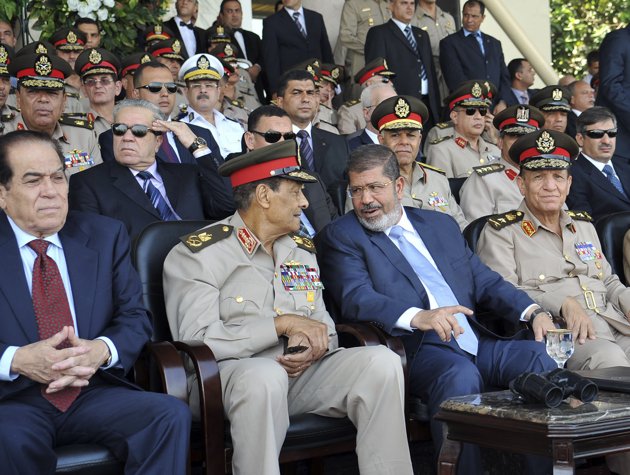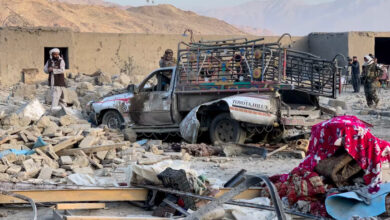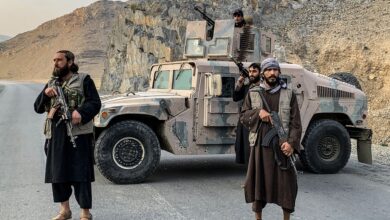
Since the Free Officers coup ended colonial rule in Egypt 60 years ago, civilian groups — both secular and Islamist — have struggled to assert themselves. As confidence in the prospects of Egypt ever reaching real civilian rule has waxed and waned, attention has turned to several other countries in which civilian forces, in many cases Islamist, have worked to dislodge entrenched military dictators. Egypt Independent takes a look at a few case studies and reveals some surprising similarities with Egypt.
Pakistan: Political pawns
Since independence, Pakistani political history has been punctuated by periods of military rule. Islamist organizations participated in the country’s independence movement before turning their attention to the country’s first elections in the 1950s. In 1958, political life came to an abrupt halt in what was to be the first of three coups.
After General Ayub Khan seized power, he disbanded all political parties. Islamist groups continued operating through their charities and social organizations.
Most of the Islamist parties today, however, did not stem from these social organizations but were instead either created or cultivated by the Pakistani military for two purposes. The first was to assist in projecting Pakistani power into Afghanistan and Kashmir through the mujahideen fighters; the second was to act as a foil against secular political parties seeking to bring the military under control.
Marvin Weinbaum, professor emeritus of political science at the University of Illinois, argues that this demonstrates the melding of foreign and domestic policy in Pakistan.
The clearest expression of this tendency followed Pakistan’s second coup in 1977, which brought the state under the control of General Muhammad Zia-ul-Haq. Soon after, the Soviet Union invaded Afghanistan, and Zia needed to hold down the left-leaning forces he had recently brushed from power.
For the general, Islamists presented an attractive counterweight to secular, progressive forces in Pakistan. They had the organizational and financial capacities to quickly compete in elections and their religious zeal made them dedicated fighters against the Soviet invasion.
The coalition of Islamists that allied themselves with the military realized they could never establish an Islamic state without army support. Other lay Islamists, such as steel magnate Nawaz Sharif, were allowed to participate to assist in massive privatization and liberalization efforts, not unlike former Egyptian President Anwar Sadat’s courting of Islamist support to ensure the successful implementation of his plan for encouraging private investment.
As the military distanced itself from leftist politicians and brought itself closer to a military relationship with the US, the alliance of Islamism and the autocratic state allowed for the repression of secular forces. Support for Islamists also provided a strong incentive for the US to maintain this relationship through military aid, lest Pakistan fall into the orbit of anti-American Islamists.
Meanwhile, the military built a business empire and sought to protect it. Hussain Nadim, a visiting fellow at the Woodrow Wilson Center for International Scholars, says military business extends into industries such as real estate, food and beverages and cement.
“People usually say in Pakistan that if you want to learn business and become a millionaire, join the Pakistani army,” he says.
Today, Pakistan’s military controls 12 percent of state land and is able to use it for commercial purposes.
In 1988, this period came to an end when Zia was killed in a plane crash. In elections later that year, the secular forces ousted by Zia were once again frustrated by Sharif’s party, the Pakistan Muslim League, and its coalition partners. The result inside civilian institutions was deadlock, a divided parliament, and a crisis of governance that allowed the military to keep its power.
Sharif and the Pakistan Muslim League eventually split from the military in a power play, publicly justified by the notion that without Zia, it was time for civilian rule. Sharif was able to garner significant Islamist support, and eventually presented such a threat to the military’s dominance that Pakistan’s third coup occurred in 1999, bringing General Pervez Musharraf to power.
Musharraf sought to undermine some of the Islamist forces due to their alliance with Sharif, but preserved their dominance in key regions near Afghanistan. He released the Legal Framework Order that allowed the president to dissolve the National Assembly and created the National Security Council to oversee the government.
Islamist parties initially reacted by leaving their coalition with the military and joining secular parties to oppose the order. But soon they made a deal with Musharraf, allowing the National Security Council to be formalized.
Musharraf had once again succeeded in dividing civilians, thereby defraying serious opposition. The gains made by civilian government under Sharif’s leadership of a broad coalition were lost. In the 2008 elections, however, Sharif and secular forces led by Benazir Bhutto — the daughter of the president Zia had deposed — formed a coalition in order to force Musharraf to resign.
Turkey: A popular mandate
Dislodging the generals or the Muslim Brotherhood, Turkey is an inspiration: a powerful state with a strong economy led by Islamists. But supporters of the military also look to the Turkish military’s defense of certain constitutional principles. Yet neither Egypt’s Islamists nor its military closely resemble their Turkish counterparts.
By and large, the Turkish military’s ideological considerations prevented any sort of support for Islamism. It has not been distracted either by preserving an economic empire, as in Egypt. And, despite both right- and left-wing political violence, the military never used Islamists as a counterweight to other types of internal opposition.
The Turkish military, guided by the National Security Council, was able to confine political competition under the broad secular ideology of Kemalism, named for Mustafa Kemal Ataturk, the founder of modern Turkey.
This was accomplished through crafting the judiciary to label or ban Islamic organizations as unlawful, as well as occasional coups. Coups in 1960 and 1980 forcibly installed military juntas, and in 1971 and 1997, ultimatums and pressure forced civilian governments to resign.
Following its first coup, the National Security Council strengthened its role through drafting the 1980 constitution. While this institutionalization of the military’s constitutional role resembles Egypt’s Supreme Council of the Armed Forces’ supplement to the Constitutional Declaration, in practice, it differed.
“In Egypt, the constitutional process so far has been iffy,” says Quinn Mecham, a political science professor at Middlebury College in the US. “It doesn’t have the same kind of sacred status that constitutional design has had in Turkey.”
This adherence to constitutionalism, albeit arguably illiberal in practice, differs significantly from Egypt, where legal ambiguity has enabled the military council to rule by fiat to protect its interests, rather than through reliance on the rule of law.
Turkey’s Islamists organized through various parties that once struggled for permission to participate in politics. Islamist figures were consistently forced to tone down how “Islamic” their parties were as the military or judiciary shuttered the National Order, Welfare and Virtue parties.
These parties’ offspring, the Justice and Development Party, (AKP) finally won elections in 2002. Taking the majority of seats in the Grand National Assembly, it could be best described as a religiously informed, rather than a religious party.
The AKP’s 2002 victory and landslide victory in 2011 provided a popular mandate to finally make a strong push for civilian control of the military. The AKP also used the European Union accession process to bolster their position.
“The beginning of accession talks in 2005 were of particular significance, underscored by current President [Abdullah] Gul’s statement that there could not be a coup in Turkey because it was on the road to EU membership,” says Bulent Aliriza, a director at the US-based Center of Strategic and International Studies.
This push survived two tests, including a direct challenge by the military in 2007 and a narrowly defeated lawsuit in 2008. The AKP was able to remain a political party, but was fined and lost public funding. In 2010, however, it passed a number of constitutional amendments with 58 percent of the vote.
While this is significant, Aliriza says the process is incomplete — a fact of which the Egyptian military is very aware. “The Egyptian military sees what is happening in Turkey and may be mindful of the implications of the drastic change in the balance of power. They may therefore be ultra-cautious as the transformation unfolds,” he says.
Indonesia: Tipping the scale
Indonesia won its independence from the Netherlands in 1949, as a result of a movement of which the Masyumi Party was a key part. Along with other Islamist groups, it was influential in the formulation of a new philosophical foundation that Indonesia’s first president, Sukarno, outlined for the newly independent state.
Masyumi, along with Nahdlatul Ulama, an Islamic party rooted in local tradition more than scripture, actively pursued legal provisions that would have obliged Muslim Indonesians to follow Sharia.
The post-independence honeymoon did not last forever. In 1960, 11 years after independence, Sukarno banned Masyumi. However, the movement lived on in its social wing, the Muhammadiyah, which focused on religious work.
The circumstances were similar to former President Gamal Abdel Nasser’s crackdown on the Brotherhood, which was banned from politics in the 1950s but lived on as a social movement through its charities, schools and preaching.
It was not long, though, before Sukarno’s successor, President Suharto, found it necessary to cultivate stronger Islamist support. As Suharto sought to crush growing communist influence, he alienated many socialists who, along with the military, formed the secular pillar of support for his regime.
Instead, Suharto bolstered the Nahdlatul Ulama’s presence. The group worked to make religious instruction in schools compulsory, and under its control, the Department of Religion expanded its staff by 60 percent.
Then, in 1973, Suharto forced a merger between Muhammadiyah and Nahdlatul Ulama to co-opt the parties. Islamist demands that Sharia be a key component of the Indonesian state soon tempered. By the 1980s, conflicts with the military pushed Suharto to again seek the support of pious elements. This time, he did not rely on Islamists as such, but on a layer within the military.
Although they were called the “green generals,” Indonesia specialist R. William Liddle says he doubts that the generals were in favor of radical changes to the Indonesian state. “These generals grew up pious, but that doesn’t necessarily have a political connotation,” Liddle says. But they were more sympathetic to Islamists than some of their colleagues.
In the run-up to the 1998 revolution that unseated Suharto, Islamic ideas spread through activism, and the Islamicized educational system, which had created a layer within society as a whole that was sympathetic to moderate Islamist ideas.
“They were already integrated into the system before democracy,” argues Liddle. Most of the mainstream Islamic parties had dropped their demands for a Sharia-based state by the time that Suharto was brought down.
Egypt’s Islamists were never brought into the political fold as in Indonesia, and, as a result. their ideology was less tempered by horse-trading within a coalition government. When Suharto stepped down, it was nominal Islamists who took power.
Suharto’s moderate Islamist vice president, BJ Habibie, assumed the presidency before overseeing the election of another Islamist, Abdurrahman Wahid. The two had little in common with the Salafi and Brotherhood politicians of Egypt today. Habibie “was so unable to recite Islamic prayers that it embarrassed people,” Liddle says.
The Indonesian Islamists and the Brotherhood are similar in that they focused on Islamicizing society through civil society work. But the Brotherhood’s relative exclusion from power has left the group’s views on religion in government correspondingly un-tempered.
Latin America: Rupture and caution
Some of the biggest success stories of democratic transitions from military to civilian rule lie on the other side of the world in Latin America. Like Egypt, the region has seen its fair share of coups and no shortage of military dictatorships. Latin American transitions have varied in their success, length and mechanisms.
David Pion-Berlin, professor of political science at the University of California, says the main dilemma for any country in transition is deciding how to reduce the military’s power. Some of these transitions have not been successful because the militaries in question have maintained significant power behind the scenes, as is the case in Guatemala.
“It’s critically important to give the military the sense that core interests will be protected,” Pion-Berlin says.
In Ecuador and El Salvador, militaries maintain extensive enterprises that go beyond the military, such as explosives and uniforms. These countries maintain their military enterprises, and their governments have had to move cautiously.
But he says that the issue will arise in times of economic difficulty and tight budgets. In these cases, militaries will “ferociously protect [their] off-budget spending,” encouraging civilian governments to disregard these funds, at least for the time being.
“That gives the military some assurances, and in the meantime militaries in turn have to allow civilians to govern. That’s what happened in [Ecuador and El Salvador], and both countries are considered viable democracies with a separation of powers, working judiciaries and working constitutions that, on paper look democratic,” Pion-Berlin says.
After transitions, military establishments in countries like Brazil maintained significant influence in politics. In other countries, such as Argentina, they have considerably less influence.
One important influence on the rapidity of transitions is the state of the military when the processes begin. In Chile, Augusto Pinochet’s government left a strong economy and was popular at the time, so the Chilean civilian government moved with caution. In Argentina, the military was disgraced after defeat in war, and the government moved more quickly. But Pion-Berlin notes that a quick transition isn’t necessarily a successful one.
“Sometimes a rupture isn’t necessarily a bad thing,” he says. “The nature of a revolution also makes a difference.”
During the initial Egyptian uprising, the regime relied on security forces, not its troops, to put down the uprising. That made a difference, Pion-Berlin says, comparing it to the differing roles the military played in Latin America.
Guaranteeing the government won’t be prosecuted for human rights abuses, or that its economic holdings will remain off-limits, may give it enough assurances to leave office.
Pion-Berlin says that pacts can facilitate a transition but that they also take some issues off the table.
“The classic pact was in Uruguay in 1985,” he says. “The military got an assurance that there would be no human rights abuse charges, and certain candidates would not be allowed to run.”
Certain conditions of the pact, agreed upon by a number of political parties, were not kept once the transition was made. Justice and reconciliation were delayed, but 20 years later, human rights abuses cases were reopened.
“If the military is still intact, it’s not a complete revolution,” he says. “That does make transition more difficult, but not impossible.”



